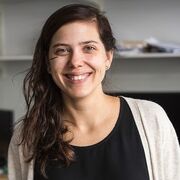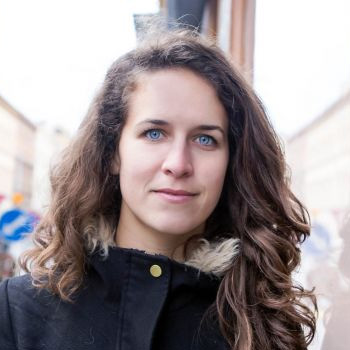FI MU Open Day, mainly for those interested in the follow-up Master's and Ph.D. studies
The event took place on the 10th of March 2021, 15:00
- Check out the Open Day recording on Youtube: https://youtu.be/c0_He-wCM4A
- Please let us know how you liked the event: https://bit.ly/03-10-openday-form
Program
FI MU vice-deans and program guarantors accompany you during the event.
15:00–15:10 Welcoming Open Day visitors, introduction to the program
15:10–15:35 Presentation of follow-up Czech Master's Programmes (in Czech)
- a general overview of Czech follow-up Master's Programmes
- Theoretical computer Science
- Software engineering
15:35–16:10 Presentation of follow-up English Master's Programmes (in English)
- a general overview of English follow-up Master's Programmes and internationalization
- Computer Systems, Communication and Security
- Visual Informatics
- Software Systems and Services Management
16:10–16:24 Ph.D. Programmes (English)
- general overview of Ph.D. Programmes and research groups at FI MU
- What is the Ph.D. study at FI MU from the student's point of view?
16:25–17:35 Presentation of seven of the 21 faculty laboratories (Czech or English)
Center for Research on Cryptography and Security (CRoCS)
Center for Research on Cryptography and Security ( CRoCS) Centre for Research on Cryptography and Security enables both graduate and pre-graduate students to gain practical experience with current security and crypto solutions and technologies. The main areas of interest are user and data authentication, secure usage of smartcards, security for Internet of Things, usable security. More specific areas of interest are selected with respect to current developments and in accordance with senior members' current research focus — for an overview of current research projects/areas see this link. Our goal is to create an environment that allows students to get hands-on experience with the available technical solutions and explore, e.g., various types of attacks in laboratory courses or when working on their thesis. The laboratory is open to students who work on projects within the FI industrial partnership framework or projects running with relevant governmental bodies.
Joint presentation: Human-Computer Interaction Laboratory (HCILAB) and Visualization Laboratory (VisIt Lab)
Human-Computer Interaction Laboratory ( HCILAB)
is dedicated to researching human-computer user interfaces, especially the research
of modern methods of interaction and virtual and augmented reality. Current research
projects include, for example, multi-user collaboration and teaching opportunities
in immersive virtual reality. We also deal with computer game development, especially
the application of modern computer graphics techniques in games.
Visualization laboratory ( VisIt Lab)
focuses on basic and applied research in complex data visualizations, visual analysis,
computer graphics, and their relationship to the virtual environment and graphic design.
He is currently working on projects in molecular, security, geographic and
medical visualization, for example.
Center for Biomedical Image Analysis (CBIA)
What can you learn about digital image processing at FI? How can we restore corrupted images or video? How can we use mathematics to describe image properties that are otherwise hard to understand? What are the principles behind image and video compression? The CBIA group brings together experts in computer science, mathematics, and physics, but also experts in biology and medicine, who study the structure and behavior of cells, which is useful for instance in disease diagnosis and treatment, and research into drug effectiveness.
Laboratory of Software Architectures and Information Systems (Lasaris)
The future of all in their own hands. Does that sound nice? Scary? Too unrealistic? Then no! In the lab Lasaris we research smart cities, smart buildings and networks, cybersecurity, IoT, and many other industries that shape each of us's future. We deal mainly with critical infrastructures, the non-functioning of which could cause significant damage. One way to attack such infrastructure is to attack from within the organization. Come and see what such an attack might look like and find out more about our laboratory!
Design and Architecture of Digital Systems Laboratory (EmLab)
In the lab EmLab Laboratory Not only teachers and students, but also robots or drones are waiting for you. You will learn how electronics are designed, programmed, and controlled in such devices. You will also find out how neutrons and gamma rays are detected in a typical environment and the vicinity of facilities working with nuclear materials, and what EmLab members work with atomic scientists. The laboratory is equipped with measuring technology and new technologies and software tools to apply programmable gate arrays (FPGA type circuits), single-chip microprocessors, and digital processing of analog signal processors (DSP type circuits). It focuses on the study, development, and application of so-called embedded systems (unique single-purpose applications).
Laboratory of Service Systems (LabSeS)
Laboratory of Service Systems (LabSeS) Nowadays, innovative solutions such as Smart City, Industry 4, Service Complexity, Internet of Things, Big Data Analytics or Digital Service are becoming more prominent in everyday life. The Laboratory of Service System (LabSeS) conducts its research on new approaches, models, platforms related to these concepts. We also explore the practical usage of modern technologies to be able to recommend the best practices in service design. We are an enthusiastic and growing team who attempts to tackle the research challenges from multidisciplinary domains named above. Our practical implementations include the design of information system applications with the specific focus on ERP systems provided as a service. In our research, we often focus on communication to the users and customers of such systems. By using advanced managerial, marketing and operational research methods we aim to bring an optimized utility and value.
We will record the action in Zoom. By actively participating, you agree to the record.
Other video presentations and sending printed materials offer
- Free sending of printed materials about FI MU (in Czech)
- Records from other FI MU Open Days
- Records of presentations of the Faculty of Informatics at the Congroo Fair
- Interactive 3D tour of the Faculty of Informatics
- Study programmes' website: programy.fi.muni.cz, Without admission exams, Individual excursions and other activities for secondary schools

Kristína Zákopčanová — a master's programme in Informatics alumna, majoring in Computer Graphics. In her doctoral studies, Kristína deals with research and creation of data visualizations in the laboratory VisIt lab. She participates in the Climate Facts project, where she is in charge of creating infographics.
The story of Kristína Zákopčanová
Dita (Přikrylová) Formánková — a master's programme in Applied Informatics alumna, majoring in Services - Research, Management and Innovation. She is a co-founder of Czechitas, a non-profit organization for the women eduction in IT. Since 2020, she has also been with Avast as Director of Diversity, Inclusion, and Community Cooperation.
The story of Dita (Přikrylová) Formánková
What does FI MU Open Day look like when the world is doing well.
Contacts
E-mail:
studijniCUgvJ3Emt@fiTyKKjSDkP.muniiFrS3JZF1.cz (preferred contact, for specific questions or for sending brochures by post)
Phone:
+420 54949 1818
E-mail:
propagaceDB3QvorNm@fiQrG-Lt_n1.muniOCozfSoq-.cz (for those interested in excursions)
Phone:
+420 54949 6282
Follow
Facebook:
FI.MUNI.CZ ,
Instagram:
@fi_muni ,
Twitter:
@fi_muni































